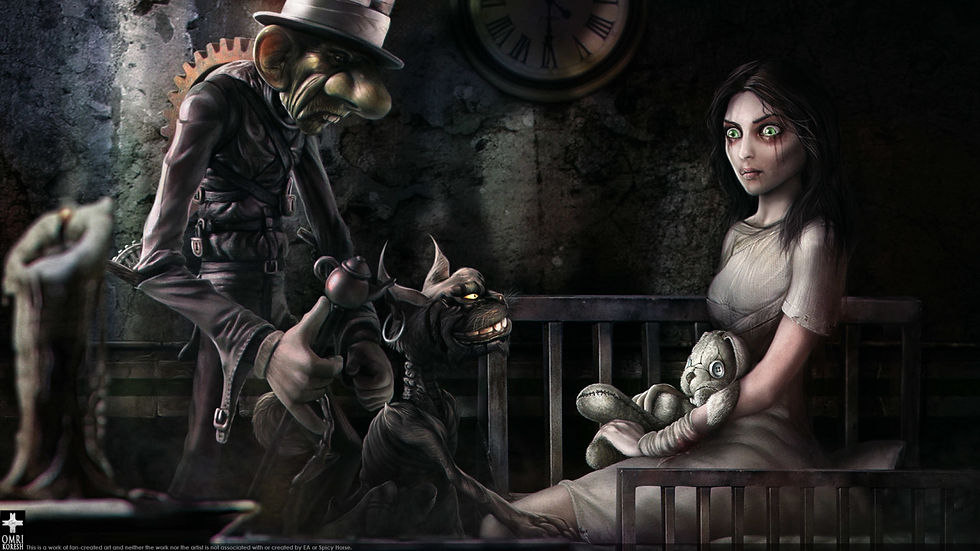Alice: Madness Returns - Arm yourself, Alices
- Indy Goodwin
- Dec 4, 2019
- 3 min read

Poor Alice. After losing her entire family in a fire and being thrown into Rutledge Asylum, she ends up in a home for wayward children run by Doctor Bumble. This is not an improvement on her situation.
Alice: Madness Returns uses mental health and treatment as a central theme. Wonderland suffers terribly as Alice’s mind is twisted and warped by Dr Bumble in an attempt to break her, turning her into a mindless doll to be prostituted out.
It would be so easy to show Madness Returns as a bad example of mental health representation. I nearly fell into that trap myself, the story making me feel very uncomfortable. Mental health treatment was shown as a punishment and barbaric, with trepanning and blood letting used. Alice was depicted as nothing more than a shell of a person, her worth stripped away because she wasn’t ‘normal’.

This poisonous attitude even spread to the denizens of Wonderland, the Cheshire Cat remarking “If you’re not on edge, you’re taking up too much space.” The Mad Hatter thinks her forgetting about the rape of her sister and murder of her family due to trauma is unforgiveable. “Forgetting is forgetting, except when it’s not. I’ve tried to forget what you’ve done, but I can’t.”
I would forgive anyone for feeling uncomfortable when facing characters with these opinions. It plays into a lot of fears mentally ill people have. If you compare Alice’s treatment to how we know we should treat mental illness sufferers today of course it’s going to be awful in comparison.
It must be remembered that Alice in Wonderland was set during the Victorian era, when hysteria was blamed on a woman’s hormones and usually attributed to a sinful life. American McGee took that setting and removed the romanticised elements of this era and showed a more realistic account of what someone with PTSD would experience.
It’s important to remember the framing. For example, The Town of Light dealt with similar madness and asylum themes, but were always very clear that this was a historical perspective. Modern treatment and perception has moved on a lot and because the game was framed like that it received acclaim for its realistic portrayal of poor Renée’s experience.
This does not mean that there is no truth to be found in a more fictional setting. The representation is bad, but not maliciously. It holds up a mirror to how things were.
There is wisdom to be found in Alice’s journey. I particularly enjoyed the speech by the Cheshire Cat at the end.
“We can't go home again. No surprise really. Only a very few find the way, and most of them don't recognize it when they do. Delusions, too, die hard with memory. Only the savage regard the endurance of pain as the measure of worth. Forgetting pain is convenient, remembering it: agonizing. But recovering the truth is worth the suffering and our Wonderland, though damaged, is safe in memory... for now."
This is an acknowledgement that, even though Alice prevailed against those who would destroy her, things will never be the same again. There is no way home. Just like those who have a mental health disability may never experience ‘normal’ again. A fight will always be needed, but it’s necessary. Not fair, but necessary to remember the prize to be won by fighting back against your mental illness.

Like Alice, there is no way home for me either. I too am fighting every day, albeit with medication and therapy, not a Vorpal blade and Hobby Horse. I’m not alone either. My Cheshire Cat and White Rabbit exist in the form of my friends and family.
If you look carefully you’ll find your White Rabbit and Hobby Horse too. So arm yourself, Alices. We might not be able to go home, but we can protect our wonderlands. In the end, a place to belong is what’s important.




Comments